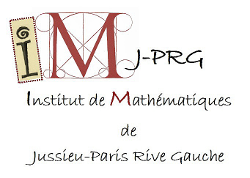| Résume | Suppose that $(K,\nu)$ is a valued field and $(L,\omega)$ is a finite extension, where $L=K[z]/(f)$. Further suppose that $A$ is a local domain which is dominated by $\nu$ and the unitary polynomial $f(z)$ is in $A[z]$. We consider the problem of computing a generating sequence for $\omega$ in $A[z]/(f)$ and computing the structure of the associated graded ring of $A[z]/(f)$ along $\omega$ as an extension of the associated graded ring of $A$ along $\nu$.
The problem of constructing generating sequences in a Noetherian local domain $A$ which is dominated by a valuation is extremely difficult, and little is known about this problem in general. It is well understood in the case that $A$ has dimension one, and for regular local rings of dimension two. It is known for certain valuations dominating two dimensional quotient singularities and for certain valuations dominating three dimensional regular local rings.
The problem of computing generating sequences for an extension $\omega$ of $\nu$ to R_\nu[z]/(f) where R_\nu is the valuation ring of $\nu$ and computing the structure of the associated graded ring of R_\nu[z]/(f) along $\omega$ as an extension of the associated graded ring of R_\nu along $\nu$ has been solved, in papers of MacLane for discrete valuations, and for general valuations by Vaquié.
In joint work with Hussein Mourtada and Bernard Teissier, we establish several theorems showing that MacLane's algorithm can often be used to compute the generators and relations of extensions of associated graded rings along a valuation.
We assume that $A$ contains an algebraically closed field $k$ such that $A/m_A\cong k$ and that the residue field of $\nu$ is isomorphic to $k$.
If the characteristic $p$ of $k$ does not divide the degree of $f$, then we give a very simple algorithm in $A[z]/(f)$ if $\omega$ is the unique extension of $\nu$.
The associated graded ring of $A[z]/(f)$ along $\omega$ is then a finitely generated and presented module over the associated graded ring of $A$ along $\nu$.
If any of the above assumptions are removed, then we give examples showing that the conclusions of the theorem do not hold
We obtain generalizations of this theorem to the case when the extension of the valuation is not unique and when we have not restriction on the degree of the field extension, which we will discuss. |

